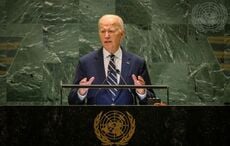Computer giant Apple has been accused of using offshore operations in Ireland to avoid billions of dollars in US taxes. The total for Ireland may be as high as $25 billion over the past three years.
A Senate permanent subcommittee on investigations says in a memorandum to senators that Apple exploited a loophole between the tax laws of Ireland and the US by not filing an income tax return or paying any income tax for one of its Irish subsidiaries in either country for five years.
Irish Foreign Minister Eamon Gilmore denied Ireland was being used as a tax haven.
“They are issues that arise from the taxation system in other jurisdictions and that’s an issue that has to be addressed first of all in those jurisdictions,” he said.
The Irish Times and The New York Times report on the claims that Apple used a complex web of offshore entities, including two Irish subsidiaries which it claims are not tax-resident anywhere, to avoid paying billions of dollars in US income taxes.
The report says the investigation brings the use of Irish companies to shift taxable US income to offshore firms in Ireland and substantially reduce the tax bill of major US corporations under intense public scrutiny.
It says Apple was incorporated in Ireland in 1980 and reported income totalling $30 billion from 2009-12.
A second Irish subsidiary, Apple Sales International, which the computer manufacturer claims is also not tax-resident anywhere, had sales revenue of $74 billion over the same period.
The report adds that the subcommittee claims that the iPhone and iPad manufacturer has negotiated a tax rate of less than 2 per cent with the Irish Government. This is significantly lower than the State’s 12.5 per cent corporate tax rate.
The sub committee says Apple has used Ireland as the base for its “extensive network of offshore subsidiaries”.
Apple chief executive Tim Cook is to appear before the Senate subcommittee at a hearing on Tuesday.
In response to the report, Apple said in testimony to the subcommittee: “It should be emphasized that AOI [Apple Operations International] does not reduce Apple’s tax bill in the US.
“If AOI did not exist, the funds it receives from other foreign subsidiaries through dividends would simply remain in the custody of those subsidiaries and would not be subject to US corporate income tax.”
The report adds that the subcommittee has highlighted how Apple has taken advantage of a difference between Irish and US tax residency rules.
Irish subsidiary, Apple Operations International, is incorporated in Ireland but it does not pay taxes in Ireland because the company is neither managed nor controlled in Ireland.
The company also does not pay taxes in the US either because it is not US tax-resident under US tax law.
Senator Carl Levin, a Democrat from Michigan and chairman of the subcommittee, said: “Apple wasn’t satisfied with shifting its profits to a low-tax offshore tax haven.
“Apple has created offshore entities holding tens of billions of dollars, claiming to be tax resident nowhere.”
“The subcommittee intends to highlight that gimmick and other tax avoidance tactics so that American working families who pay their share of taxes understand how offshore tax loopholes raise their tax burden, add to the federal deficit and ought to be closed.”
Senator John McCain said Apple claimed to be the largest US corporate taxpayer but that it was also among America’s largest tax avoiders.
He said: “It is important to understand Apple’s Byzantine tax structure so that we can effectively close the loopholes utilised by many US multinational companies.”
Apple has said it employs 4,000 people in Ireland.
A statement from the company said: “Apple does not move its intellectual property into offshore tax havens and use it to sell products back into the US in order to avoid US tax; it does not use revolving loans from foreign subsidiaries to fund its domestic operations; it does not hold money on a Caribbean island; and it does not have a bank account in the Cayman Islands.”
The company has admitted that its Irish subsidiary, Apple Operations International, has no presence or employees in Ireland and pays no tax here as a result, but neither is it tax resident in the US.




Comments